Related Research Articles
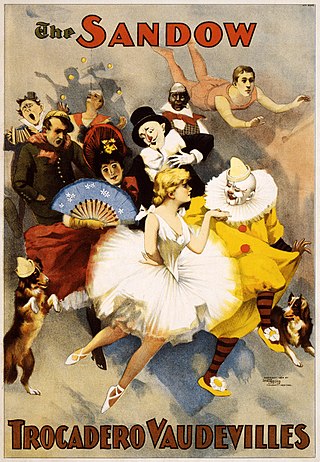
Vaudeville is a theatrical genre of variety entertainment which began in France at the end of the 19th century. A vaudeville was originally a comedy without psychological or moral intentions, based on a comical situation: a dramatic composition or light poetry, interspersed with songs or ballets. It became popular in the United States and Canada from the early 1880s until the early 1930s, while changing over time.
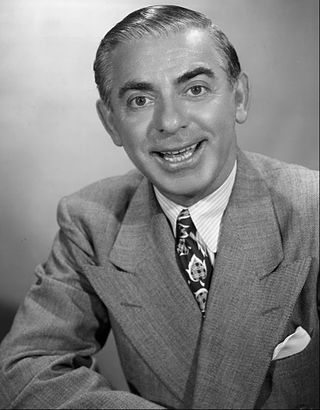
Eddie Cantor was an American comedian, actor, dancer, singer, songwriter, film producer, screenwriter and author. Cantor was one of the prominent entertainers of his era.
Harriet Nelson was an American actress. Nelson is best known for her role on the sitcom The Adventures of Ozzie and Harriet.

Edward James Begley Sr. was an American actor of theatre, radio, film, and television. He won an Academy Award for Best Supporting Actor for his performance in the film Sweet Bird of Youth (1962) and appeared in such classics as 12 Angry Men (1957), Odds Against Tomorrow (1959) and The Unsinkable Molly Brown (1964). He was nominated for an Emmy Award for his portrayal of Matthew Harrison Brady in a television adaptation of Inherit the Wind. He is the father of the actor and environmental activist Ed Begley Jr.

The Original Amateur Hour is an American radio and television program. The show was a continuation of Major Bowes Amateur Hour, which had been a radio staple from 1934 to 1945. Major Edward Bowes, the originator of the program and its master of ceremonies, left the show in 1945 and died the following year. He was ultimately succeeded by Ted Mack, when the show was brought into television in 1948.

Charles Sherwood Stratton, better known by his stage name "General Tom Thumb", was an American with dwarfism who achieved great fame as a performer under circus pioneer P. T. Barnum.
Dave Elman, birth name David Kopelman, was a noted American radio host, comedian, and songwriter, and important figure in the field of hypnosis. He is most known today as the author of Findings in Hypnosis (1964). Over the course of his life, he was also well known as the creator and host of the popular radio show Hobby Lobby as well as a songwriter and lyricist.
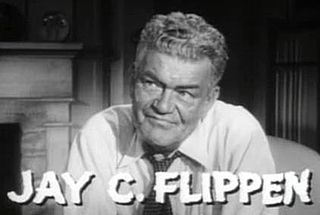
Jay C. Flippen was an American character actor who often played crusty sergeants, police officers or weary criminals in many 1940s and 1950s pictures, particularly in film noir. Before his motion-picture career he was a leading vaudeville comedian and master of ceremonies.

Educational Pictures, also known as Educational Film Exchanges, Inc. or Educational Films Corporation of America, was an American film production and film distribution company founded in 1916 by Earle Hammons (1882–1962). Educational primarily distributed short subjects; it is best known for its series of comedies starring Buster Keaton (1934–37) and the earliest screen appearances of Shirley Temple (1932–34). The company ceased production in 1938, and finally closed in 1940 when its film library was sold at auction.
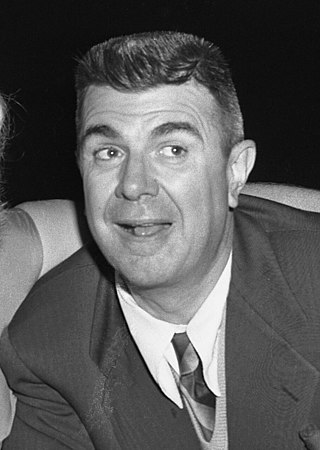
Ken Murray was an American comedian, actor, radio and television personality and author.

Jules Munshin was an American actor, comedian and singer who had made his name on Broadway when he starred in Call Me Mister. His additional Broadway credits include The Gay Life and Barefoot in the Park. On screen, he is best remembered for On the Town, in which he co-starred with Frank Sinatra and Gene Kelly as sailors on leave in New York City.

Tim Moore was an American vaudevillian and comic actor of the first half of the 20th century. He gained his greatest recognition in the starring role of George "Kingfish" Stevens in the CBS TV's The Amos 'n' Andy Show. He proudly stated, "I've made it a point never to tell a joke on stage that I couldn't tell in front of my mother."

Can You Top This? was a radio panel game in which comedians told jokes and tried to top one another. The unrehearsed program, sponsored at one point by a papaya-flavored soft drink called Par and later by Colgate-Palmolive, was created by veteran vaudevillian "Senator" Edward Hastings Ford, who claimed he was taking part in a joke session at a New York theatrical club when he conceived the idea. However, the format was quite similar to a prior joke-telling radio series, Stop Me If You've Heard This One (1939–40), which featured Ford and cartoonist Harry Hershfield as panelists. Many jokes involved ethnic humor told in dialect.

Louis Holtz was an American vaudevillian, comic actor, and theatrical producer.

Lurene Tuttle was an American actress and acting coach, who made the transition from vaudeville to radio, and later to films and television. Her most enduring impact was as one of network radio's more versatile actresses. Often appearing in 15 shows per week, comedies, dramas, thrillers, soap operas, and crime dramas, she became known as the "First Lady of Radio".
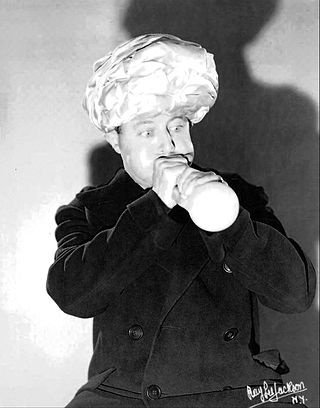
Joe Cook was an American vaudeville performer. He was a household name in the 1920s and 1930s as one of America's most popular entertainers, and he headlined at New York's famed Palace Theatre. After appearing on Broadway, he broke into radio performance.
Edward Ford may refer to:
Joe Laurie Jr. was an American vaudeville monologist who later performed on radio and on Broadway. He was born in New York City.
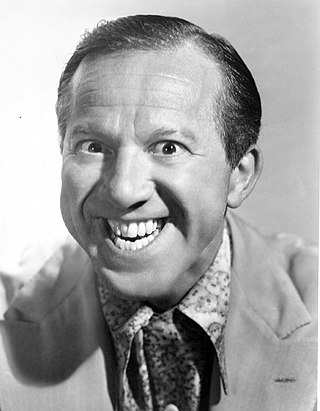
Jerry Lester was an American comedian, singer and performer on radio, television and the stage, known for playing the father of the main characters, Mike Firpo, in the comedy Odds and Evens and who hosted the first network late night television program as host of Broadway Open House on NBC, a vaudeville-esque combination of comedy and music, whose success demonstrated the potential for late-night television and led to the creation of the Tonight Show.
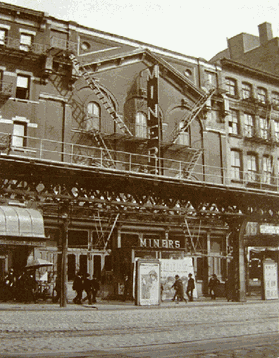
Miner's Bowery Theatre was a vaudeville or variety show theater opened in the Bowery of New York by Senator Henry Clay Miner in 1878.
References
- 1 2 3 4 5 "Senator Ford, Radio Comedian, Dies". The New York Times . January 28, 1970. Retrieved 2015-02-10.
- 1 2 3 "Edward Hastings Ford papers". Stony Brook University. Retrieved 2015-02-10.
- ↑ "Edward Hastings Fauth". ancestors.familysearch.org. Retrieved 25 June 2023.
- 1 2 Emery, Fred (October 16, 1943). "On the Air". The Edinburg Daily Courier. Edinburg, Indiana. Edinburg Daily Courier. p. 2. Retrieved April 25, 2016– via Newspapers.com.

- ↑ "'Senator' Ford, Comedian, Dies". The Bridgeport Post. Bridgeport, Connecticut. January 28, 1970. p. 57. Retrieved April 25, 2016– via Newspapers.com.

- ↑ "'Senator Ford,' 70, To Get Married". The Post-Standard. Syracuse, New York. June 21, 1957. p. 1. Retrieved April 25, 2016– via Newspapers.com.
